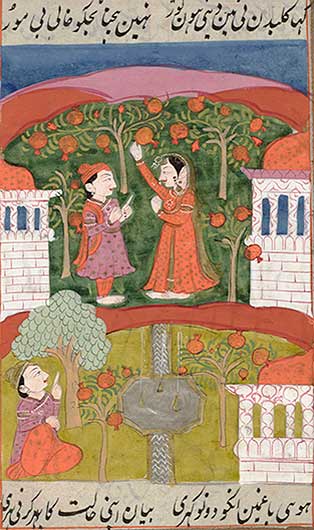

In my examination of particular Sufis and their teachings, I will of course bring up the key Qur’anic passages and ahadith that they bring up. Rather than starting with the jewels of the Qur’an and the highlights of the Prophetic tradition before moving on to the statements of the Sufis, I would like to propose that we undertake a more historical study of the Sufis themselves. One could easily take that time-honored approach, yet in this essay I would like to proceed in a slightly different fashion. There is no doubt great merit in going through the passages of the Qur’an, identifying all the many verses that talk about the great intimacy between humanity and the Divine: one could point to the very identification of the Divine as both Rahman and rahim, often translated as “compassionate, merciful”, or perhaps even more accurately, “Infinite Tenderness, Eternal Kindness.” One could point to the passages that talk about God as being closer to the believers than their own selves, as well as the ones that emphasize the quality of God’s being overflowing in love towards those who have faith. It is, surely, a well-respected practice. This approach has also been followed by many contemporary scholars of Islam and Sufism. In order to fully situate Islamic mysticism ( tasawwuf ) as an unmistakably Islamic discourse, the early Sufis present Sufism as largely emerging out of the Qur’an and the statements of the Prophet Muhammad ( ahadith, sing. There is another tendency that I would like to avoid in this presentation. Still, my focus in this essay will be on the Islamic articulations of the Path of Love. In offering a genealogy of the madhhab-i ‘ishq, it is also important to point out that there were important pre-Islamic and early Islamic strands of love discourse (such as the ‘udhri love tradition ) that would be soon woven into this path. For such a person, even the claim of love, even the name of love, are forbidden! One who has not experienced it considers it all a legend. Only a lover knows the true value of love. This is what the Sufis of this path referred to as the “taste” ( dhauq ) of love: What holds this thousand-year old “path” together is neither creedal statements nor particular initiatory rituals, but rather an aesthetic, a “mood”, a rasa : the intuitive experience of love, which must be tasted personally. Hazrat Inayat Khan’s heartfelt poem in many ways stands in a thousand-year-old line of what has been referred to as the madhhab-i ‘ishq, or “Path of Love” in Islam. Thou thyself art love, art lover, and thyself art the beloved She took me gently by my arms and lifted me above the earth, “Disclose to me, I pray thee, O love, thy secret.” I went through hell and saw there love’s raging fire,Īnd I entered heaven illumined with the light of love.Īnd when my fiery glance fell on the rocks,Īnd when I cried aloud the name of my beloved, Set afire every heart that came in touch with it. Here is one of his most well known poems on the theme of love:Īnd have been raised above life’s joy and sorrow. His languages were Gujarati and English, not Arabic. He was in many ways a typical figure of 20th century globalism: a young Indian man who was sent to Europe, performed classical Hindustani concerts, and then brought his message of universal mysticism to the United States. While my focus in this essay will be the notions of love, human and Divine, as espoused in the earliest and most foundational sources, let us begin with a 20th century Muslim mystic expressing these same ideas. There is a strong tendency among many scholars of Islam, and other observers and scholars, to treat the legacy of Islamic thought through the trite lens of a “Golden Age”, followed by the inevitable “decline.” This favoring of “Classical” Islam usually translates into a favoring of Muslims who lived from 632-1258, lived in what today we would call the Middle East, and wrote primarily in Arabic. On the “Path of Love” Towards the Divine: A Journey with Muslim Mystics


 0 kommentar(er)
0 kommentar(er)
